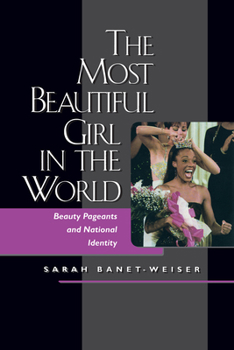The Most Beautiful Girl in the World: Beauty Pageants and National Identity
Select Format
Select Condition 
Book Overview
Sarah Banet-Weiser complicates the standard feminist take on beauty pageants in this intriguing look at a hotly contested but enduringly popular American ritual. She focuses on the Miss America pageant in particular, considering its claim to be an accurate representation of the diversity of contemporary American women. Exploring the cultural constructions and legitimations that go on during the long process of the pageant, Banet-Weiser depicts the beauty pageant stage as a place where concerns about national identity, cultural hopes and desires, and anxieties about race and gender are crystallized and condensed. The beauty pageant, she convincingly demonstrates, is a profoundly political arena deserving of serious study.
Drawing on cultural criticism, ethnographic research, and interviews with pageant participants and officials, The Most Beautiful Girl in the World illustrates how contestants invent and reinvent themselves while articulating the female body as a national body. Banet-Weiser finds that most pageants are characterized by the ambivalence of contemporary "liberal" feminism, which encourages individual achievement, self-determination, and civic responsibility, while simultaneously promoting very conventional notions of beauty. The book explores the many different aspects of the Miss America pageant, including the swimsuit, the interview, and the talent competitions. It also takes a closer look at some extraordinary Miss Americas, such as Bess Myerson, the first Jewish Miss America; Vanessa Williams, the first African American Miss America; and Heather Whitestone, the first Miss America with a disability.
Drawing on cultural criticism, ethnographic research, and interviews with pageant participants and officials, The Most Beautiful Girl in the World illustrates how contestants invent and reinvent themselves while articulating the female body as a national body. Banet-Weiser finds that most pageants are characterized by the ambivalence of contemporary "liberal" feminism, which encourages individual achievement, self-determination, and civic responsibility, while simultaneously promoting very conventional notions of beauty. The book explores the many different aspects of the Miss America pageant, including the swimsuit, the interview, and the talent competitions. It also takes a closer look at some extraordinary Miss Americas, such as Bess Myerson, the first Jewish Miss America; Vanessa Williams, the first African American Miss America; and Heather Whitestone, the first Miss America with a disability.
Format:Paperback
Language:English
ISBN:0520217918
ISBN13:9780520217911
Release Date:September 1999
Publisher:University of California Press
Length:290 Pages
Weight:1.10 lbs.
Dimensions:0.8" x 6.1" x 9.0"
Customer Reviews
1 rating
how cultural studies is done well
Published by Thriftbooks.com User , 21 years ago
Taking the Miss America pageant as both an object of study and a lens through which to view issues of race, class, and gender, Banet-Weiser explores how social conditions and concerns are "mediated in and through women's bodies." She attempts to navigate such disparate positions as a feminist abhorrence toward Miss America and a conservative celebration of the pageant, weaving together interviews and criticism and attending to the relationship between contestants' on-stage performances and private identities. Banet-Weiser notes that people dismissed the idea of beauty pageants as object of scholarly pursuit as either too frivolous and meaningless to warrant intellectual attention, or so blatant a reinscription of dominant ideology as to be untheorizable; Banet-Weiser's description of the dismissals of her intended scholarship also provide a barometer for the problems one faces producing a theory of some aspect of popular culture. She acknowledges her own involvement in the dominant beauty system at the outset and keeps us cognizant of her pursuit of "a way to critique cultural discourses and practices that objectify, alienate, or otherwise fragment the female body without treating the contestants themselves as somnolent victims of false consciousness."






